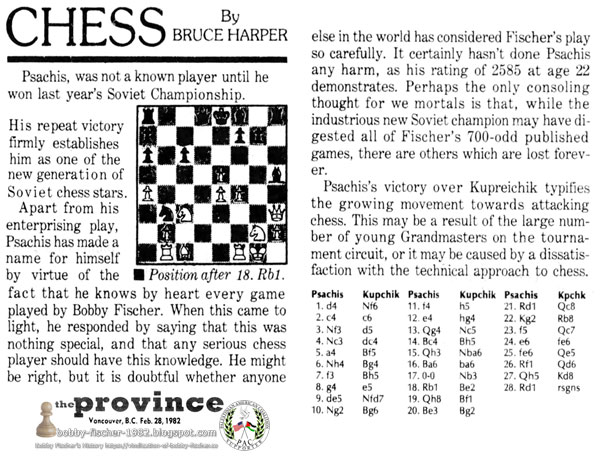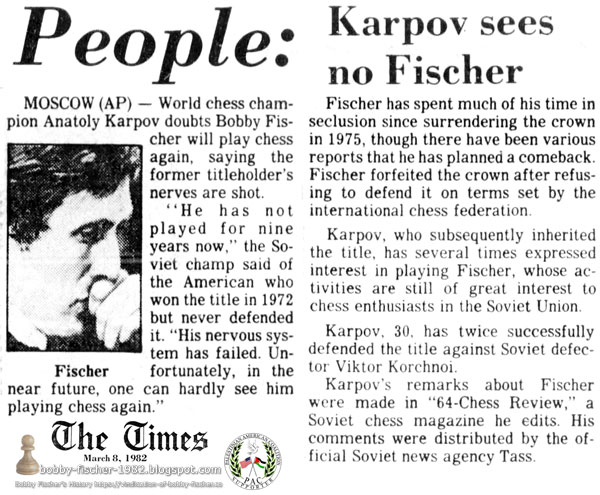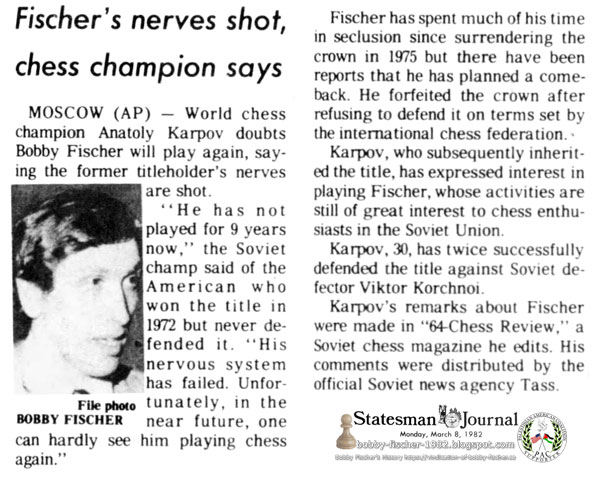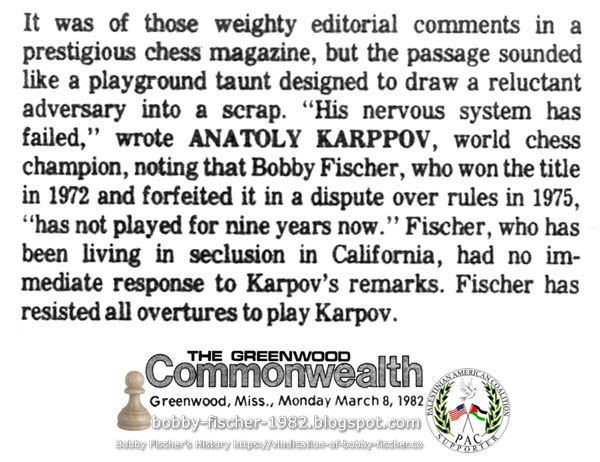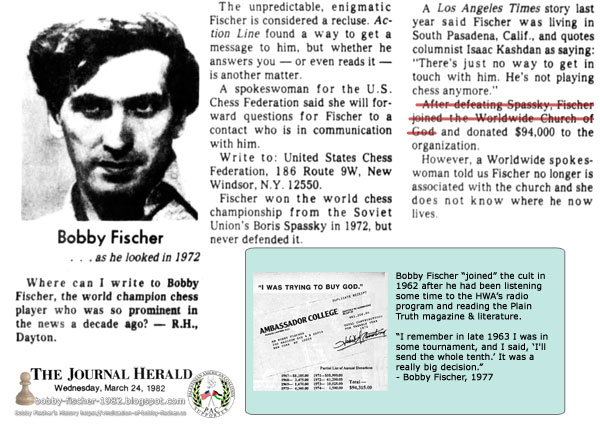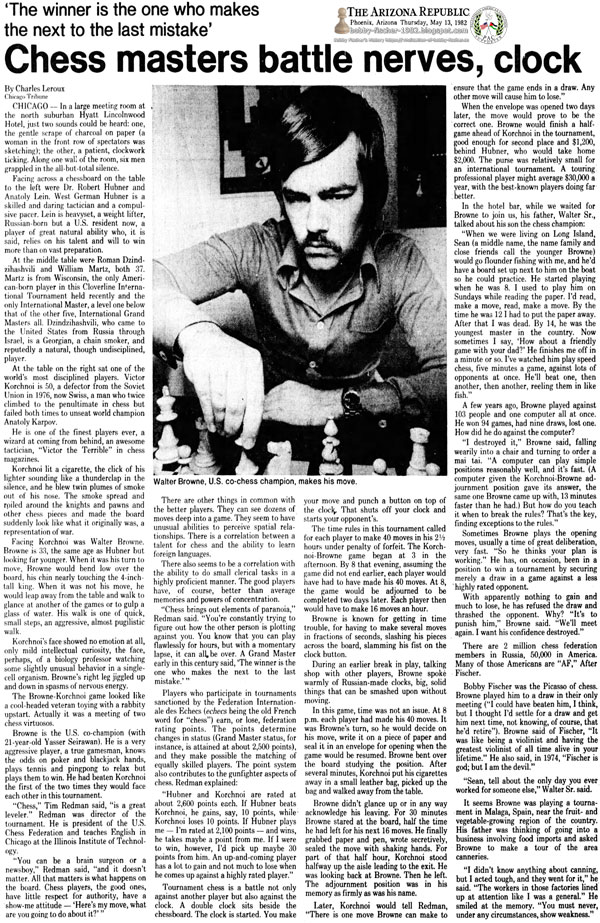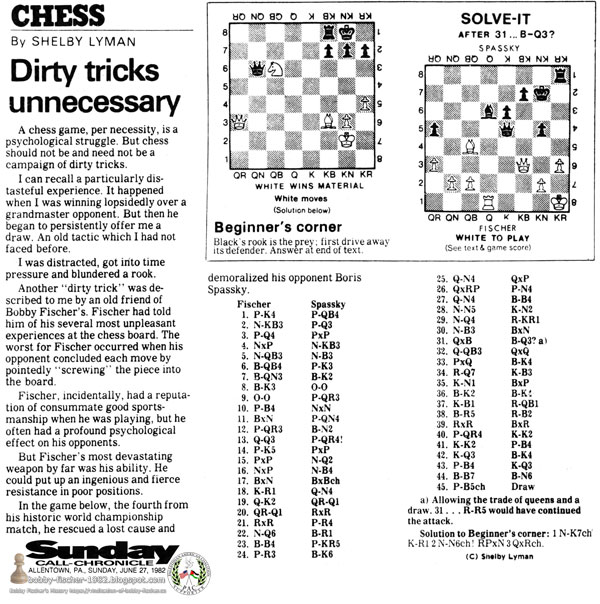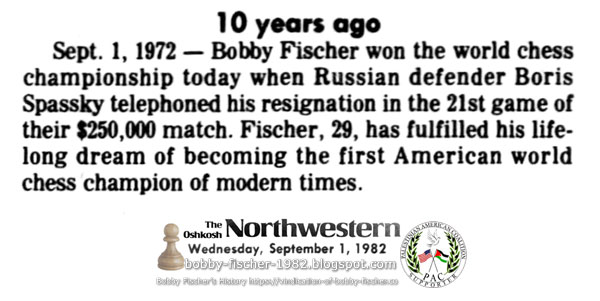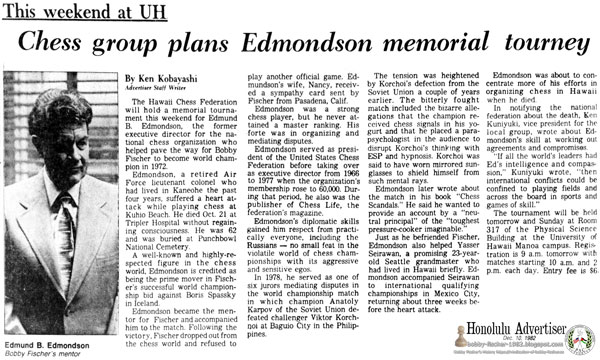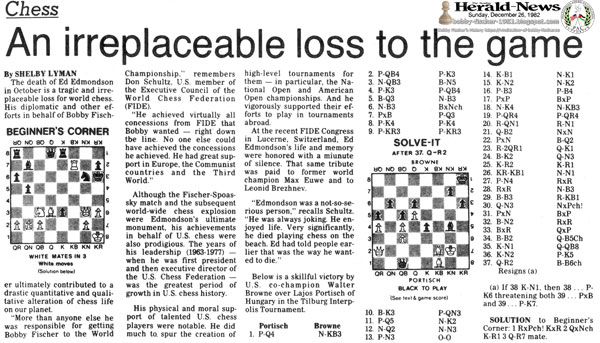The Province Vancouver, British Columbia, Canada Sunday, February 28, 1982 - Page 83
Chess: Psachis and the Games of Fischer
Psachis, was not a known player until he won last year's Soviet Championship.
His repeat victory firmly establishes him as one of the new generation of Soviet chess stars.
Apart from his enterprising play, Psachis has made a name for himself by virtue of the fact that he knows by heart every game played by Bobby Fischer. When this came to light, he responded by saying that this was nothing special, and that any serious chess player should have this knowledge. He might be right, but it is doubtful whether anyone else in the world has considered Fischer's play so carefully. It certainly hasn't done Psachis any harm, as his rating of 2585 at age 22 demonstrates. Perhaps the only consoling thought for we mortals is that, while the industrious new Soviet champion may have digested all of Fischer's 700-odd published games, there are others which are lost forever.
Psachis's victory over Kupreichik typifies the growing movement towards attacking chess. This may be a result of the large number of young Grandmasters on the tournament circuit, or it may be caused by a dissatisfaction with the technical approach to chess.
The Times, Shreveport, Louisiana, Monday, March 08, 1982 - Page 2
Karpov sees no Fischer
Moscow (AP) — World chess champion Anatoly Karpov doubts Bobby Fischer will play chess again, saying the former titleholder's nerves are shot.
“He has not played for nine years now,” the Soviet champ said of the American who won the title in 1972 but never defended it. “His nervous system has failed. Unfortunately, in the near future, one can hardly see him playing chess again.”
Fischer has spent much of his time in seclusion since surrendering the crown in 1975, though there have been various reports that he has planned a comeback. Fischer forfeited the crown after refusing to defend it on terms set by the international chess federation.
Karpov, who subsequently inherited the title, has several times expressed interest in playing Fischer, whose activities are still of great interest to chess enthusiasts in the Soviet Union.
Karpov, 30, has twice successfully defended the title against Soviet defector Viktor Korchnoi.
Karpov's remarks about Fischer were made in “64-Chess Review,” a Soviet chess magazine he edits. His comments were distributed by the official Soviet news agency Tass.
The Greenwood Commonwealth, Greenwood, Mississippi, Monday, March 08, 1982 - Page 2
Anatoly Karpov vs. Fischer
It was of those weighty editorial comments in a prestigious chess magazine, but the passage sounded like a playground taunt designed to draw a reluctant adversary into a scrap. “His nervous system has failed,” wrote ANATOLY KARPOV, world chess champion, noting that Bobby Fischer, who who the title in 1972 and forfeited it in a dispute over rules in 1975, “has not played for nine years now.” Fischer, who has been living in seclusion in California, had no immediate response to Karpov's remarks. Fischer has resisted all overtures to play Karpov.
The Journal Herald Dayton, Ohio Wednesday, March 24, 1982 - Page 6
Contacting Bobby Fischer
Where can I write to Bobby Fischer, the world champion chess player who was so prominent in the news a decade ago? — R.H., Dayton.
The unpredictable, enigmatic Fischer is considered a recluse. Action Line found a way to get a message to him, but whether he answers you — or even reads it — is another matter.
A spokeswoman for the U.S. Chess Federation said she will forward questions for Fischer to a contact who is in communication with him.
Fischer won the world chess championship from the Soviet Union's Boris Spassky in 1972, but never defended it.
A Los Angeles Times story last year said Fischer was living in South Pasadena, Calif., and quotes columnist Isaac Kashdan as saying: “There's just no way to get in touch with him. He's not playing chess anymore.”
Fischer donated at least $94,000 to the Worldwide Church of God.
However, a Worldwide spokeswoman told us Fischer no longer is associated with the church and she does not know where he now lives.
Arizona Republic Phoenix, Arizona Thursday, May 13, 1982 - Page 64
Chess Masters Battle Nerves, Clock
“There are 2 million chess federation members in Russia, 50,000 in America. Many of those Americans are “AF,” After Fischer.
Bobby Fischer was the Picasso of chess. Browne played him to a draw in their only meeting (“I could have beaten him, I think, but I thought I'd settle for a draw and get him next time, not knowing, of course, that he'd retire.”) Browne said of Fischer, “It was like being a violinist and having the greatest violinist of all time alive in your lifetime.” He also said, in 1974, “Fischer is god; but I am the devil.”
The Morning Call Allentown, Pennsylvania Sunday, June 27, 1982 - Page 139
Dirty Tricks Unnecessary
A chess game, per necessity, is a psychological struggle. But chess should not be and need not be a campaign of dirty tricks.
I can recall a particularly distasteful experience. It happened when I was winning lopsidedly over a grandmaster opponent. But then he began to persistently offer me a draw. An old tactic which I had not faced before.
I was distracted, got into time pressure and blundered a rook.
Another “dirty trick” was described to me by an old friend of Bobby Fischer's. Fischer had told him of his several most unpleasant experiences at the chess board. The worst for Fischer occurred when his opponent concluded each move by pointedly “screwing” the piece into the board.
Fischer, incidentally, had a reputation of consummate good sportsmanship when he was playing, but he often had a profound psychological effect on his opponents.
But Fischer's most devastating weapon by far was his ability. He could put up an ingenious and fierce resistance in poor positions.
In the game below, the fourth from his historic world championship match, he rescued a lost cause and demoralized his opponent Boris Spassky.
The Oshkosh Northwestern Oshkosh, Wisconsin Wednesday, September 01, 1982 - Page 4
10 Years Ago
Sept. 1, 1972 — Bobby Fischer won the world chess championship today when Russian defender Boris Spassky telephoned his resignation in the 21st game of their $250,000 match. Fischer, 29, has fulfilled his life-long dream of becoming the first American world chess champion of modern times.
The Honolulu Advertiser Honolulu, Hawaii Friday, December 10, 1982 - Page 40
Chess Group Plans Edmund B. Edmondson Memorial Tourney By Ken Kobayashi
The Hawaii Chess Federation will hold a memorial tournament this weekend for Edmund B. Edmondson, the former executive director for the national chess organization who helped pave the way for Bobby Fischer to become world champion in 1972.
Edmondson, a retired Air Force lieutenant colonel who had lived in Kaneohe the past four years, suffered a heart attack while playing chess at Kuhio Beach. He died Oct. 21 at Tripler Hospital without regaining consciousness. He was 62 and was buried at Punchbowl National Cemetery.
A well-known and highly-respected figure in the chess world, Edmondson is credited as being the prime mover in Fischer's successful world championship bid against Boris Spassky in Iceland.
Edmondson became the mentor for Fischer and accompanied him to the match. Following the victory, Fischer dropped out from the chess world and refused to play another official game. Edmondson's wife, Nancy, received a sympathy card sent by Fischer from Pasadena, Calif.
Edmondson was a strong chess player, but he never attained a master ranking. His forte was in organizing and mediating disputes.
Edmondson served as president of the United States Chess Federation before taking over as executive directory from 1966 to 1977 when the organization's membership rose to 60,000. During that period, he also was the publisher of Chess Life, the federation's magazine.
Edmondson's diplomatic skills gained him respect from practically everyone, including the Russians — no small feat in the volatile world of chess championships with its aggressive and sensitive egos.
In 1978, he served as one of six jurors mediating disputes in the world championship match in which champion Anatoly Karpov of the Soviet Union defeated challenger Viktor Korchnoi at Baguio City in the Philippines.
The tension was heightened by Korchnoi's defection from the Soviet Union a couple of years earlier. Edmondson later wrote about the match in his book “Chess Scandals.” He said he wanted to provide an account by a “neutral principal” of the “toughest pressure-cooker imaginable.”
Just as he befriended Fischer, Edmondson also helped Yasser Seirawan, a promising 23-year-old Seattle grandmaster who had lived in Hawaii briefly. Edmondson accompanied Seirawan to international qualifying championships in Mexico City, returning about three weeks before the heart attack.
Edmondson was about to concentrate more of his efforts in organizing chess in Hawaii when he died.
In notifying the national federation about the death, Ken Kuniyuki, vice president for the local group, wrote about Edmondson's skill at working out agreements and compromises.
“If all the world's leaders had Ed's intelligence and compassion,” Kuniyuki wrote, “then international conflicts could be confined to playing fields and across the board in sports and games of skill.”
The tournament will be held tomorrow and Sunday at Room 317 of the Physical Science Building at the University of Hawaii Manoa campus. Registration is 9 a.m. tomorrow with matches starting 10 a.m. and 2 p.m. each day.
The Herald-News Passaic, New Jersey Sunday, December 26, 1982 - Page 72
An Irreplaceable Loss to the Game
The death of Ed Edmondson in October is a tragic and irreplaceable loss for world chess. His diplomatic and other efforts in behalf of Bobby Fischer ultimately contributed to a drastic quantitative and qualitative alteration of chess life on our planet.
“More than anyone else he was responsible for getting Bobby Fischer to the World Championship,” remembers Don Schultz, U.S. member of the Executive Council of the World Chess Federation (FIDE).
“He achieved virtually all concessions from FIDE that Bobby wanted — right down the line. No one else could have achieved the concessions he achieved. He had great support in Europe, the Communist countries and the Third World.”
Although the Fischer-Spassky match and the subsequent world-wide chess explosion were Edmondson's ultimate monument, his achievements in behalf of U.S. chess were also prodigious. The years of his leadership (1963-1977) — when he was first president and then executive director of the U.S. Chess Federation — was the greatest period of growth in U.S. chess history.
His physical and moral support of talented U.S. chess players were notable. He did much to spur the creation of high-level tournaments for them — in particular, the National Open and American Open championships. And he vigorously supported their efforts to play in tournaments abroad.
At the recent FIDE Congress in Lucerne, Switzerland, Ed Edmondson's life and memory were honored with a minute of silence. That same tribute was paid to former world champion Max Euwe and to Leonid Brezhnev.
“Edmondson was a not-so-serious person,” recalls Schultz. “He was always joking. He enjoyed life. Very significantly, he died playing chess on the beach. Ed had told people earlier that was the way he wanted to die.”
Below is a skillful victory by U.S. co-champion Walter Browne over Lajos Portisch of Hungary in the Tilburg Interpolis Tournament.











